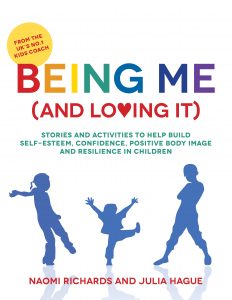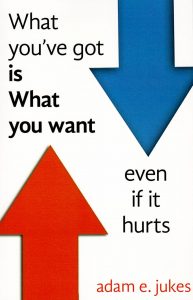This week is Mental Health Awareness Week, so I’m posting some of the stuff that’s landed in my inbox in relation to it. Today I’ve got a couple of books that look interesting, one for children and one for adults. The first book, Being Me (and Loving It), looks particularly relevant to boys as their self esteem is crucial at a young age, where they often lag behind girls academically. The second book, What you’ve got is what you want – Even if it hurts, looks like it could be a challenging read but I suppose in essence you need to be challenged to change.
Being Me (and Loving It)
 This innovative book, created by Naomi Richards (The Kids Coach) and Julia Hague, takes 29 real-life case studies to demonstrate why self-esteem and body confidence in children aged 5-11 is important … and how to build confidence. Each example is presented as part of a ready-to-use lesson plan that builds into a comprehensive, usable guide for teachers, but it is also proving incredibly popular with parents who want to support their child.
This innovative book, created by Naomi Richards (The Kids Coach) and Julia Hague, takes 29 real-life case studies to demonstrate why self-esteem and body confidence in children aged 5-11 is important … and how to build confidence. Each example is presented as part of a ready-to-use lesson plan that builds into a comprehensive, usable guide for teachers, but it is also proving incredibly popular with parents who want to support their child.
This book covers a huge range of issues including lack of body confidence, feeling pressured by peers, bullying, and worries about puberty. To create the lesson-plan structure, each story is preceded by guidance on how to introduce the topic and the learning outcomes and is followed by a range of activities to reinforce the messages being taught. Publishing by JKP, the book (released April 2016) is a multifaceted resource that could be used with groups of children in PSHE lessons or in one-to-one settings in therapy or at home.
 Psychoanalyst Adam E Jukes’ previous books have tackled the roots of toxic masculinity but his new title provides a revolutionary viewpoint for all relationships, particularly broken ones. “You are responsible for everything that is wrong with your relationship including any behaviour of your partner which you use to justify, excuse, or in any other way account for your own behaviour towards him/her, or the world in general.”
Psychoanalyst Adam E Jukes’ previous books have tackled the roots of toxic masculinity but his new title provides a revolutionary viewpoint for all relationships, particularly broken ones. “You are responsible for everything that is wrong with your relationship including any behaviour of your partner which you use to justify, excuse, or in any other way account for your own behaviour towards him/her, or the world in general.”